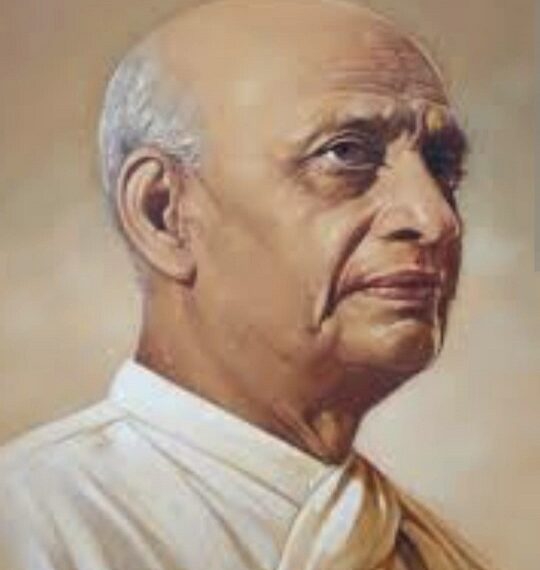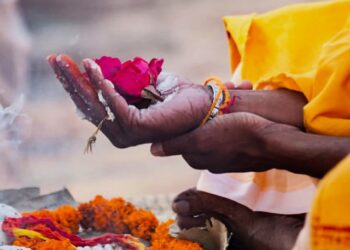Dr. Ansuman Kar, Bhubaneswar, 31 October 2025
Another 31st October is round the corner and another year of celebration of National Unity day is up the sleeves. 31st October off late took the national stage since 2014 with the arrival of the present regime at the centre. Not going into the politics or intent of the celebration, let us look at the merit of the observance.
Vallabhbhai Jhaveribhai Patel, popularly known as Sardar Vallabhbhai Patel, was a freedom fighter and one of the most prominent leaders of congress in the pre & post independence era so much so that he was entrusted with the responsibility of unifying and carving the map of today’s India at the junction of Independence. He was an integral part of the first independent government of India and immediately after Independence, from 1948-1950, it was believed that India was governed by the ‘triumvirate’ of C.Rajgopalachari-Nehru-Patel. Prime Minister Nehru was immensely popular with the masses, but Patel enjoyed the loyalty and the faith of the rank and file of Congressmen, state leaders, and India’s civil servants. If Nehru was the Face then Patel was the Strategy of the then Government of India. The journey of Vallabhbhai Patel to become popular as “ SARDAR” is a journey of great sacrifice and perseverance towards nation building.
It was his strong belief in maintaining the sovereignty of the federal structures of the princely states that helped him in winning both their confidence and acceptance of India. This is proved by the trust shown by Gandhi when he said to Patel, “The problem of the States is so difficult that you alone can solve it.” Patel was considered a statesman of integrity with the practical acumen and resolve to accomplish a monumental task.
It was his firm belief in the need of All India Services for the governance of a nation that led to the creation of the civil services, which in his own words he called “the steel frame” of a country. It was his affirmative nature that brough about a robust administrative structure in the country.
It was his resolute persistence that today Junagadh and Hyderabad are part of India. The Nawab of Junagadh acceded to Pakistan against the referendum of the states majority, i.e., Hindus. Patel combined diplomacy with force, demanding that Pakistan annul the accession, and that the Nawab accede to India. He sent the Army to occupy three principalities of Junagadh to show his resolve. Following widespread protests and the formation of a civil government, or Aarzi Hukumat, both Bhutto and the Nawab fled to Karachi, and under Patel’s orders the Indian Army and police units marched into the state. A plebiscite organised later produced a 99.5% vote for merger with India.
Unlike Pandit Nehru, Patel was both decisive and more practical in his vision. While Pandit Nehru was at times in some dilemma, Patel was always clear in his actions. When a delegation of Gujarati farmers came to him citing their inability to send their milk production to the markets without being fleeced by intermediaries, Patel exhorted them to organise the processing and sale of milk by themselves, and guided them to create the Kaira District Co-operative Milk Producers’ Union Limited, which preceded the Amul milk products brand. Patel also pledged the reconstruction of the ancient but dilapidated Somnath Temple in Saurashtra against all odds, i.e., Nehru’s secular policy. This decision proves his decisive nature towards what he believed was right.

Patel has always been a team man. Though there were ample differences of opinion he always respected the decisions of Pandit Nehru as the head of the Government and stood behind him rock solid. This flexibility is actually his virtue of being accommodative for a better cause. In 1949 a crisis arose when the refugees, in many cases Hindus, were being forcibly evicted by Pakistani authorities, and were victims of intimidation and violence. Nehru invited Liaquat Ali Khan, Prime Minister of Pakistan, to find a peaceful solution. Despite his aversion, Patel reluctantly met Khan and discussed the matter. Patel strongly criticised Nehru’s plan to sign a pact that would create minority commissions in both countries and pledge both India and Pakistan to a commitment to protect each other’s minorities. Syama Prasad Mookerjee and K. C. Neogy, two Bengali ministers, resigned, and Nehru was intensely criticised in West Bengal for allegedly appeasing Pakistan. The pact was immediately in jeopardy. Patel, however, publicly came to Nehru’s aid. He gave emotional speeches to members of Parliament, and the people of West Bengal, and spoke with scores of delegations of Congressmen, Hindus, Muslims, and other public interest groups, persuading them to give peace a final chance.
Patel being someone connected to the grassroots was always reasonable and far sighted. Today, India and Pakistan are always at diplomatic loggerheads in international forums especially in the UN with regard to the issue of Kashmir. Patel strongly advised Nehru against going for arbitration to the United Nations, insisting that Pakistan had been wrong to support the invasion and the accession to India was valid. He did not want foreign interference in a bilateral affair. Today, if we re-analyse that decision of Nehru, we can definitely say that Indo-Pak relations would have been much peaceful today had it not been for those momentary yet monumental mistakes. In another incident, during the Delhi riots post-partition, understanding that Delhi and Punjab policemen, accused of organising attacks on Muslims, were personally affected by the tragedies of partition, Patel called out the Indian Army with South Indian regiments to restore order, imposing strict curfews and shoot-at-sight orders, which shows his strong reasoning power.
So, we can rightly say Vallabhai deserved the title “SARDAR” that can be expanded to mean the following:
S – Sovereign
A – Affirmative
R – Resolute
D – Decisive
A – Accomodative
R – Reasonable






